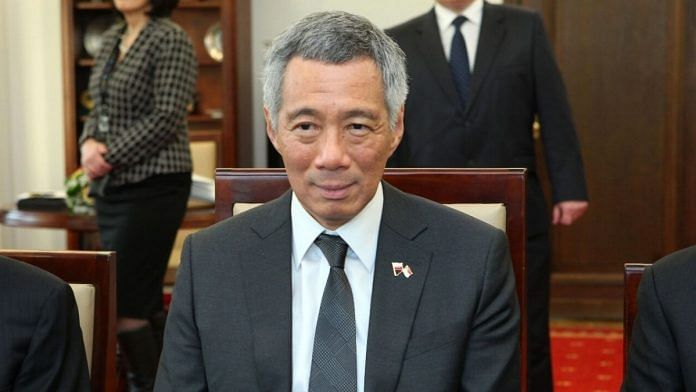Sparkling water or still? And please note the plastic slip for your mask next to the napkin,” our waiter reminded us Saturday night at a restaurant across from Singapore’s iconic Marina Bay Sands Casino.
Compliance isn’t a polite request. Taking bites and sipping drinks are one of the few public, mask-free moments people can enjoy as Singapore emerges from two months of lockdown. With flouters facing fines and prosecution, it’s clear the government is leaving little to chance.
The stakes are high. Singapore will hold one of the world’s first general elections of the Covid-19 era on July 10. A lot rides on whether life can resume without the infection surge seen in other nations. This also means the polls become a referendum on Prime Minister Lee Hsien Loong’s handling of the crisis. A big spike in cases might require fresh restrictions and push the economy even deeper into recession.
Voter concern about renewed outbreaks might also dent the government’s majority in parliament. The People’s Action Party has won every election since independence in 1965, but takes each contest seriously. When the party’s share of the vote dipped to about 60% in 2011, it was a considered an upset. The PAP made up ground in 2015 and is campaigning as vigorously this year as social distancing rules will allow.
Lee explained the decision to move quickly in a June 23 announcement: “An election now — when things are relatively stable — will clear the decks and give the government a fresh, full five-year mandate.” With the pace of new infections down significantly from their peak, four fiscal stimulus packages passed, and the law requiring polls by April next year, the government didn’t want to miss this window. Challenges in the coming years will be formidable.
The ruling party has much in its favor. Coronavirus fatalities remain very low. The country is one of the richest in the world, has excellent schools, a first-rate health care system and a robust social-safety net. Meanwhile, the opposition is disunited, with divisive rhetoric discouraged.
Given the advantages of strong executive power and Singapore’s reputation for technocratic excellence, though, it’s worth asking whether the “circuit breaker” — the local euphemism for the lockdown — could have been implemented more smoothly.
Singapore was late to close schools relative to other nations and, for a while, leaders gave assurances that there wouldn’t be a lockdown. Officials prevaricated over the use of masks. When the circuit breaker came, it came hard. This was all pretty jarring in a place that normally runs like a Swiss watch, as I’ve written.
Dorms for migrant workers, who keep the economy ticking, became a hot spot. These cases account for the bulk of the 43,661 total, as of Monday. Then consider that the Covid crackdown may have inadvertently exacerbated a surge in outbreaks of dengue as people stayed home and there were fewer workers to spray and clean up pools of water, where mosquitoes that carry the disease breed.
Also read: Singapore’s food delivery surge during lockdown highlights plastic waste problems
The second of a three-phase reopening, which seeks to restore most aspects of economic life, has also had its share of bumps. A top minister announced on June 15 that many businesses and facilities would open just days later. Several appeared to be caught off-guard. Some said they would open, then backtracked. Many indicated they were awaiting clarification from an array of ministries and agencies.
Business owners have found that there’s little room for error. A curry joint in the expat enclave of Holland Village was ordered to shut down because patrons weren’t distancing properly. Two food and beverage places on Amoy Street, a tony locale, were closed and fined after diners were found drinking alcohol after 10:30 p.m. An indoor sports hall was given a time-out after a coronavirus patient mixed with other badminton players. Restaurants that have opened are quickly getting accustomed to spot checks from officials to make sure everything is on the up and up. As our dinner table was cleared Saturday, wine was first to be removed, well in advance of the witching hour.
Singapore doesn’t allow opinion polls, though most observers anticipate a comfortable PAP victory. It’s really about the margin of victory, say political scientists. A significant erosion of support might signal challenges that a new generation of leaders will have to address. Lee has indicated he will stand aside in the coming parliamentary term, giving the fourth-generation team of PAP officials a chance to govern. Deputy Prime Minister Heng Swee Keat, also minister for finance, is widely seen as Lee’s successor.
It would be narrow-minded to criticize Singapore’s virus response too heavily; I can’t think of many countries that managed this pandemic particularly well. The relative successes of Singapore and other Asian governments in containing the outbreak caught global attention, and left many wondering whether the Western democratic model can handle a crisis of this magnitude. Lee and his colleagues studiously refrain from the kind of bombastic populism that’s characterized the politics of Europe and the U.S. in recent years.
Yet for all its careful management and authority, Singapore’s reopening has progressed in fits and starts. Offices in the central business district, home of many banks and multinational regional headquarters, remain largely empty. Nothing is the way it was, nor will that way of life return anytime soon, according to the government’s campaign message. For decades, the PAP has relied on predictability. In the coronavirus era, however, uncertainty is the one thing we can count on.- Bloomberg
Also read: Singapore focuses on job creation, investing in schools to counter Covid social divide



